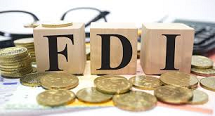Nigeria’s Foreign Direct Investment (FDI) plunged to $29.83 million in the second quarter of 2024, marking its lowest point since data collection began in 2013. This significant drop, as reported by the National Bureau of Statistics (NBS), reflects a sharp decline of 65.33 per cent compared to the $86.03 million recorded in the same period last year.
Moreover, the FDI figure fell by 74.97 per cent from the $119.18 million reported in Q1 2024. Most of the investment in Q2 2024, valued at $29.82 million, came from equity, down 74.98 per cent from Q1. Year-on-year, equity investments also suffered a 65.33 per cent decline from $86.02 million in Q2 2023.
The other component of FDI, “Other Capital,” contributed only $0.0085 million, down 33.33 per cent from both the previous quarter and the same period in 2023. Although typically a minor part of FDI, this further reduction underscores Nigeria’s struggle to attract capital amid global and domestic challenges.
While FDI continues to dwindle, other capital importation sources remain substantial, particularly foreign currency loans. In Q2 2024, Nigeria recorded $2.60 billion in capital imports, with loans making up a massive 98.08 per cent—totaling $2.55 billion. These loans, alongside portfolio investments and direct loans, indicate a shift toward safer financial instruments as investors shy away from long-term commitments.
This trend reflects a growing reliance on short-term debt instruments, which, while providing immediate liquidity, do not offer the stability and growth potential of direct investments in infrastructure or physical assets.
Nigeria also witnessed a notable decrease in portfolio investments and foreign currency loans in Q2 2024. Portfolio investments totaled $1.40 billion, a steep 74.97 per cent fall from $5.60 billion in Q1 2024 and a 65.33 per cent year-on-year drop from $4.05 billion in Q2 2023. Similarly, loans decreased by 74.98 per cent, with inflows of $1.15 billion in Q2 2024, compared to $4.60 billion in the previous quarter. This marks a 65.33 per cent decline from $3.32 billion in Q2 2023.
The sharp decline in FDI raises concerns about Nigeria’s long-term economic growth, particularly as the country strives to diversify its economy beyond oil and gas. FDI is typically seen as a stable source of capital that can foster job creation and infrastructure development. However, these figures suggest that foreign investors remain cautious due to uncertainties in Nigeria’s policies, security challenges, and the changing global economy.
Despite government efforts to improve the business climate and attract foreign investment, the latest data indicates these reforms have yet to yield substantial long-term capital inflows.
Earlier this year, President Bola Tinubu announced $30 billion in FDI commitments within the first nine months of his administration, aimed at strengthening the Nigerian economy. However, current data does not yet reflect this optimistic outlook.





